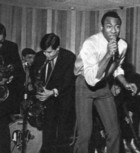
Single on Sunshine label, double-sided hit with Shakin’ All Over.
This beat arrangement of Que Sera Sera is noted for the sound of a sports whistle being blown at the beginning of each verse. The story that this was an innovation by the record’s producer turns out to be unfounded. See below for influential versions by Earl Royce & The Olympics and by The High Keys, both of which feature The Whistle.
Melbourne singer Normie Rowe became Australia’s top teen idol of the late 60s and the star of Ivan Dayman’s Sunshine label. He had a string of hits in Australia from 1965, recorded four singles in London, toured Britain and America, and even inspired a tribute song, Norman-Normie. After he was conscripted to serve in Vietnam he never regained his earlier ‘King of Pop‘ status, but he re-established himself as a respected performer, especially on stage, starring in such productions as Les Miserables and Annie.
Thanks to Bill Casey (Spin Records historian) for pointing out the ultimate source of the Normie Rowe arrangement, and to Terry Stacey for tracking down the influential Earl Royce version.
Further reading: 1. Normie Rowe biography at Milesago. 2. Official site at NormieRowe.com
Single on Columbia by popular West German beat band formed in 1959, another version in the style of the High Keys arrangement. The Lords also had a hit with Johnny Kidd’s Shakin’ All Over, the song on the other side of Normie Rowe’s Que Sera Sera.
♫ Listen at YouTube
Further reading: 1. The Lords biography by Richie Unterberger at All Music. 2. Wikipedia entry. 3. Lords releases at Swiss Music Charts. 4. Official site at TheLords.de. Version alert from Rod Stone.
Single on Columbia label by Liverpool band that appeared in the Gerry & the Pacemakers film Ferry Across the Mersey.
Normie Rowe’s 1965 Australian record is clearly influenced by this Merseybeat arrangement, right down to the distinctive whistle. The ultimate source though, is the 1963 US version by The High Keys (see below).
Earl Royce & The Olympics – Que Sera Sera.mp3
Thank you to Terry Stacey for his powers of musical detection. Thanks also to Rod Stone.
Further reading: 1. Earl Royce & Olympics page archived from FabGear. 2. Earl Royce post at Anorak Thing, 2 Aug 2011.
On album I Am P. J. Proby December 1964.
Texas-born James Marcus Smith, better known as P. J. Proby, was more popular in the UK (where he worked for part of the 60s), and in Australia, than in his home country. This version of Whatever Will Be Will Be (Que Sera Sera) uses the familiar High Keys/Earl Royce/Normie Rowe arrangement, although this time The Whistle is missing.
References: 1. P. J. Proby page from British Beat Boom [archived page]. 2. P. J. Proby at Wikipedia.
Further reading: My post Only in Oz (2) P.J. Proby – Mission Bell at PopArchives: The Blog. Michael Lane Heath, Get Hip to My Conflagration from Perfect Sound Forever [archived page].
Thanks to Terry Stacey for version alert and links.
Single on Atco, produced by Bob Crewe, the producer and songwriter (with Bob Gaudio) behind most of the Four Seasons’ hits. The arranger is Charles Calello, the Four Seasons’ arranger who had also been in the proto-Seasons group The Four Lovers.
It is clear right from the opening bars that this High Keys recording, complete with whistle, is the forerunner of the Earl Royce and Normie Rowe versions. That familiar post-Doris Day arrangement, here in its pre-Merseybeat form, turns out have a calypso feel in which the whistle makes perfect sense.
The High Keys (also, High Keyes) were led by Troy Keyes who formed the group in 1963 with Jimmy Williams, another solo singer with Atco. Both The High Keys and Troy Keyes achieved later recognition through the Northern Soul movement: The High Keys for Living A Lie (1966) and Keyes for Love Explosions (1967, also released as Love Explosion).
Further reading: Troy Keyes biography by Jason Ankeny at All Music.
From the Alfred Hitchcock film The Man Who Knew Too Much (1956). Doris Day stars as the wife of a diplomat whose family is mixed up in an assassination plot while holidaying abroad. The Doris Day character sings Whatever Will Be, Will Be (Que Sera Sera) early in the film, and again at an important point in the film’s climax.
Written by profilic film composers Jay Livingston & Ray Evans
Further reading: 1. LivingstonAndEvans.com. 2. NYT obituary for Jay Livingston, 2001. 3. Jay Livingston and Ray Evans listings at IMDb.
Geno Washington, a highly regarded American soul singer, was a serviceman who stayed in the UK after his tour of duty there. He joined British R&B/soul big band The Ram Jam Band in 1965. According to All Music writer John Bush, Washington had the grit of a deep soul testifier like Wilson Pickett or Don Covay.

Geno Washington And The Ram Jam Band had four charting singles in the UK from mid-1966 till early 1967: Water (#39), Hi Hi Hazel (#45), Que Sera Sera (#43) and Michael (#39).
See also: Hi Hi Hi Hazel.
British band Dexy’s Midnight Runners had a hit in 1980 with Geno, their tribute to Geno Washington.
Further reading: Geno Washington biography by John Bush at All Music.
Single on Apple outside Britain: the British single (Apple #16 and #27) was not released. Charted #7 on Billboard's Adult Contemporary chart.
The breakthrough for Welsh singer Mary Hopkin was her appearance on the talent show Opportunity Knocks. Her first single, an international hit, was Those Were The Days, the second single released on The Beatles' Apple label (1968, #1 UK, #1 USA Cashbox and elsewhere). She was something of a protégée of Paul McCartney who produced Those Were The Days and her first album, Postcard.
See also Knock Knock Who's There.
Further reading: 1. MaryHopkin.co.uk (official site; the biography page hands you over to the Wikipedia entry). 2. Mary Hopkins Friendly Society (fan site).